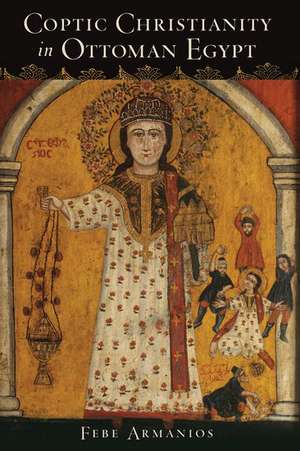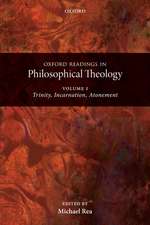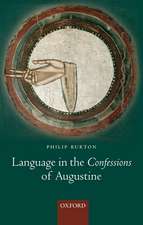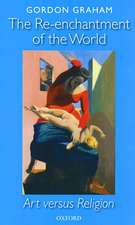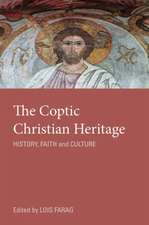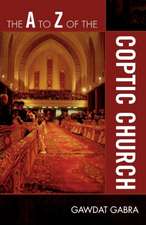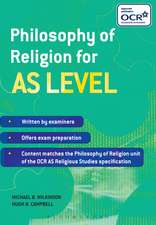Coptic Christianity in Ottoman Egypt
Autor Febe Armaniosen Limba Engleză Paperback – 25 iun 2015
| Toate formatele și edițiile | Preț | Express |
|---|---|---|
| Paperback (1) | 291.45 lei 31-37 zile | |
| Oxford University Press – 25 iun 2015 | 291.45 lei 31-37 zile | |
| Hardback (1) | 671.96 lei 31-37 zile | |
| Oxford University Press – 17 mar 2011 | 671.96 lei 31-37 zile |
Preț: 291.45 lei
Nou
Puncte Express: 437
Preț estimativ în valută:
55.77€ • 58.37$ • 46.42£
55.77€ • 58.37$ • 46.42£
Carte tipărită la comandă
Livrare economică 19-25 martie
Preluare comenzi: 021 569.72.76
Specificații
ISBN-13: 9780190247225
ISBN-10: 0190247223
Pagini: 272
Ilustrații: black & white illustrations
Dimensiuni: 155 x 231 x 20 mm
Greutate: 0.36 kg
Editura: Oxford University Press
Colecția OUP USA
Locul publicării:New York, United States
ISBN-10: 0190247223
Pagini: 272
Ilustrații: black & white illustrations
Dimensiuni: 155 x 231 x 20 mm
Greutate: 0.36 kg
Editura: Oxford University Press
Colecția OUP USA
Locul publicării:New York, United States
Recenzii
Febe Armanios establishes her rightful place as a leading scholar whose expertise covers the yawning gap between late antiquity and the contemporary period... Coptic Christianity in Ottoman Egypt should appeal to multiple scholarly audiences in Middle Eastern history and religious studies... Beyond a scholarly audience, this monograph, now available in affordable paperback version, merits a broader readership for anyone interested in the life of minority communities in the Arab Muslim world.
A fascinating and important contribution to Ottoman Egyptian history, Coptic history, and the history of minorities under Muslim rule.
A rigorous yet richly imaginative analysis of Egypt's Coptic community in the early modern period.... Via deep analysis of a limited corpus of available documentary sources, Armanios has succeeded in shedding important new light on a significant but heretofore little understood era in Coptic history.
This is a very valuable book: the first comprehensive assessment of the Coptic community and its diverse religious expressions in the Ottoman period . The book deserves to be widely read. It should be of interest to social, political, ecclesiological and intellectual historians, especially to those interested in minority cultures and issues of identity formation and maintenance. With its generally clear writing style and logical structure, the book should also be accessible to students and a wider readership, for example within the Coptic community.
Febe Armanios has written an innovative, fascinating, and thoroughly researched work of relevance to anyone interested in the history of the Copts and of Christians in the Middle East. She explores an array of novel archival sources and shows how Ottoman-era Copts used different spaces-festivals, pilgrimages, church pulpits-to articulate their social, political, and spiritual concerns. This is the first study of its kind and it serves as a welcomed reminder that the Coptic historical perspective, long marginalized in the scholarship, adds a lot to our understanding of the early modern Middle East."
Coptic Christianity in Ottoman Egypt represents a refreshing new trend in scholarship on Christians and Jews in Muslim-majority societies. Rather than depicting non-Muslims as either passive beneficiaries of Muslim tolerance or victims of Muslim persecution, Armanios makes Christians the agents of history. Utilizing an impressive array of Coptic writings to narrate how Copts formed a Christian ethos, Armanios contributes to our understanding of early modern Egyptian religion."
In this important study, Febe Armanios illuminates Coptic religious life in the Ottoman era by analyzing martyr cults, festivals, pilgrimage, and sermons. Tensions between lay leaders and clergy, and efforts to cultivate relations with Muslim rulers, foster Coptic identity and piety, and defend against Catholic proselytizing provide much-needed context for understanding Coptic history in the nineteenth and twentieth centuries."
Coptic christianity in Ottoman Egypt provides a rigorous yet richly imaginative analysis of Egypt's coptic community in the early modern period.
The author's remarkable study contributes to clarify the complexity of Muslim-Christian relations and of the internal dynamics of the Coptic community not only in the Ottoman period but also in contemporary Egypt.
Short, eloquent, and well-researched...This book is a wonderful contribution to multiple fields of scholarship and should be warmly welcomed.
well researched and attractively presentedmonograph
A fascinating and important contribution to Ottoman Egyptian history, Coptic history, and the history of minorities under Muslim rule.
A rigorous yet richly imaginative analysis of Egypt's Coptic community in the early modern period.... Via deep analysis of a limited corpus of available documentary sources, Armanios has succeeded in shedding important new light on a significant but heretofore little understood era in Coptic history.
This is a very valuable book: the first comprehensive assessment of the Coptic community and its diverse religious expressions in the Ottoman period . The book deserves to be widely read. It should be of interest to social, political, ecclesiological and intellectual historians, especially to those interested in minority cultures and issues of identity formation and maintenance. With its generally clear writing style and logical structure, the book should also be accessible to students and a wider readership, for example within the Coptic community.
Febe Armanios has written an innovative, fascinating, and thoroughly researched work of relevance to anyone interested in the history of the Copts and of Christians in the Middle East. She explores an array of novel archival sources and shows how Ottoman-era Copts used different spaces-festivals, pilgrimages, church pulpits-to articulate their social, political, and spiritual concerns. This is the first study of its kind and it serves as a welcomed reminder that the Coptic historical perspective, long marginalized in the scholarship, adds a lot to our understanding of the early modern Middle East."
Coptic Christianity in Ottoman Egypt represents a refreshing new trend in scholarship on Christians and Jews in Muslim-majority societies. Rather than depicting non-Muslims as either passive beneficiaries of Muslim tolerance or victims of Muslim persecution, Armanios makes Christians the agents of history. Utilizing an impressive array of Coptic writings to narrate how Copts formed a Christian ethos, Armanios contributes to our understanding of early modern Egyptian religion."
In this important study, Febe Armanios illuminates Coptic religious life in the Ottoman era by analyzing martyr cults, festivals, pilgrimage, and sermons. Tensions between lay leaders and clergy, and efforts to cultivate relations with Muslim rulers, foster Coptic identity and piety, and defend against Catholic proselytizing provide much-needed context for understanding Coptic history in the nineteenth and twentieth centuries."
Coptic christianity in Ottoman Egypt provides a rigorous yet richly imaginative analysis of Egypt's coptic community in the early modern period.
The author's remarkable study contributes to clarify the complexity of Muslim-Christian relations and of the internal dynamics of the Coptic community not only in the Ottoman period but also in contemporary Egypt.
Short, eloquent, and well-researched...This book is a wonderful contribution to multiple fields of scholarship and should be warmly welcomed.
well researched and attractively presentedmonograph
Notă biografică
Febe Armanios is Assistant Professor of History at Middlebury College. In her most recent research, she investigates Coptic religious revivalism and charismatic renewal in the modern era.
